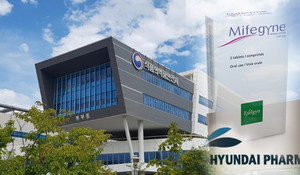Hyundai Pharm recently applied for marketing approval for Mifegymiso, an abortion pill, but the Ministry of Food and Drug Safety (MFDS) remained passive to accelerate the review process.
Industry watchers are questioning why the regulator has reversed its stance after promising accelerated approval for the drug.
A medication that induces miscarriage other than surgical abortions had been illegal in Korea. However, with the revision of the Mother and Child Health Act to allow women to abort a fetus up to 14 weeks, experts have called for the introduction of medication abortion.

As no abortion drug has been available in Korea, people illegally distributed abortion drugs through the internet. This prompted more voices for approving a miscarriage-inducing drug.
In March, Hyundai Pharm signed an exclusive agreement with Linepharma International, a U.K.-based drugmaker, to sell Mifegymiso in the domestic market.
The ministry had said it would help the company introduce the abortion pill by conducting a preliminary review. During a preliminary review, the government reviews safety and efficacy data in advance to reduce trial and error during the approval application process.
Hyundai Pharm said that it had submitted data for approval for Mifegymiso, an oral treatment for abortion, to the ministry on July 2.
However, with the start of the official review process, the ministry suddenly changed its stance, saying it could seek an external advisory review by the Central Pharmaceutical Affairs Review Committee. As a natural abortion drug contains an unauthorized ingredient, the ministry will review it based on the criteria for new drug approval, the regulator said.
“During the approval process, we could request an external advisory review by the Central Pharmaceutical Affairs Review Committee,” a ministry official said. “But it is hard to explain the process because it is still uncertain.”
He added that Mifegymiso was not subject to the accelerated approval review instead of the regulator’s previous position.
This month, the government was expected to disclose the preliminary review results on Mifegymiso, which began in February, but the outlook has become uncertain.
“There could be a problem in the review process. So, we are not sure we can announce the results within July,” the ministry official said.
Some observers said the ministry might have become reluctant because granting the nod for Mifegymiso could create political and ethical debates. The government might want to avoid criticism from some civic and religious groups opposing artificial abortion.
However, some politicians are demanding the introduction of the abortion pill in Korea.
“Governments should not turn a blind eye to women who have no choice but to rely on unsafe abortion drugs and harm their health,” said Rep. Kwon In-sook of the ruling Democratic Party. “We have to guarantee the right to health of women who decide to terminate a pregnancy by revising the law for Mifegymiso introduction and conducting the drug approval process simultaneously.”
The Association of Pharmacists for Healthy Society (APHS), a pro-choice group, emphasized that the ministry had said it would introduce an abortion drug through accelerated review and that it should keep its promise.
“If the regulator goes ahead with a closed meeting of outside experts, it may not be able to reflect social demands,” the APHS said. “Also, if the ministry approves for a narrow indication for Mifegymiso, it might overshadow the original purpose of giving better access to abortion drugs.”

